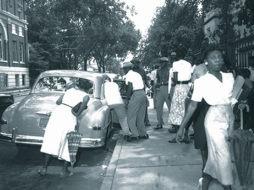
In 1950 the Baton Rouge City Council decided that the best way for them to support the financially failing municipal bus company was to revoke the licenses of 40 competing Black-owned bus companies. Black riders had no choice but to ride segregated buses but they refused to settle for this.
Reverend T.J. Jemison took the lead by filing a complaint to the city council. The council responded with Ordinance 222 which allowed Blacks to sit in “white” seats if the bus was not crowded. That wasn’t enough.
Black leaders in the town formed the United Defense League to protest bus segregation. They realized that the only way to make the system listen was to hit them where it hurt the most, their pockets.
For eight days Black riders protested. Hundreds of Black car owners carried passengers to and from work. The city bus system was financially ruined, and eventually compromised with the community for a reduction of white-only-seats.
The Baton Rouge Bus Boycott should inspire us all to act together to make change. Our dollars run this nation and withholding it from places that don’t support us never fails.